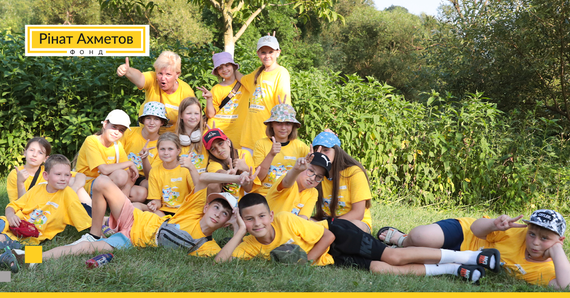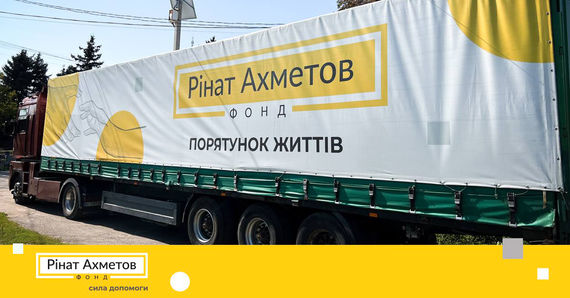Oleh Romanchuk, Psychotherapist: We need professionals to help people right here and right now!

The final 6th module of Rinat Akhmetov Humanitarian Center's "Trauma of War" course started on May 11 in Kyiv. The main subject of the module was "Focusing Trauma. Cognitive-behavioral therapy (CBT)". Oleh Romanchuk, the coach of the module, a psychotherapist, child psychiatrist, the founder of the Ukrainian Institute of Cognitive Behavior Therapy will talk about the psychological body armor that should protect people during war, about psycho-traumatic disorders and how to treat them.
– Oleh, could you please explain the essence of CBT method. Who needs this therapy?
– One of the consequences of war impact on the mental health of a person is a post-traumatic stress disorder (PTSD). In peaceful life this diagnosis occurs at 7% of people, but among those, who have been in the area of military actions, every fifth has PTSD, i.e. the total number of people that need help has increased to 20%. This disorder requires an adequate treatment. International protocols recommended using two effective methods of treatment: trauma-focused cognitive behavioral therapy and eye movement desensitization and reprocessing.
The sixth module of "Trauma of War" training course is dedicated to "Cognitive behavioral therapy", because today this is the best way to help people with PTSD. Using this method can guarantee PTSD elimination for nearly 80% of people.
– This is the final stage if training within the "Trauma of War" course. What are the specific goals of the sixth module?
– We understand that the course participants already have a sufficient basis and know different methods of healing war-time trauma. The sixth module teaches them specific techniques, by using them the course participants will be able to treat simple forms of PTSD. It is clear that a full training should be longer and more in-depth. But due to the fact that there is war in our country now, and we need specialists that are ready to help people right here and right now, the Ukrainian Institute of CBT has developed a special educational video program. We described all intervention protocols, developed training materials. Four days of training should be enough for learning the basics of care and treatment of PTSD.
– How does the method of cognitive behavioral therapy work?
– Treatment by CBT includes three stages. At the first stage, using the "physical injury" metaphor, we are working on stabilization of state, as first of all we need to strengthen an organism. To do this, we use special techniques of stabilization through which people can improve their psychological state. These are techniques that allow people to control intrusive memories, get rid of nightmares and regulate their heavy emotional state.
At the second stage we are "cleaning and sewing up the wound". At this stage, the main technique is re-experiencing the traumatic situation in our imagination. We use the so-called Oxford approach, when a person with closed eyes recalls the event, helping the brain to understand that it is already in the past. Experiencing an event for several times, we send it to archive, it is receding into the past.
And at the third stage of rehabilitation, when "the wound has healed," we need to restore person's functioning in different areas, adapt him/her to a new life. Here we help a person to think what kind of new life he/she wants to build, what resources and knowledge are required for this matter.
– Probably, the population remaining on the non-government controlled areas has the biggest mental health problems?
– A number of studies show that participation in war or residence on the territory where military operations are conducted significantly increase the frequency of mental disorders, both among military people and civilians. First of all, it is depression, PTSD, anxiety, psychoactive drug abuse.
There is a popular myth now that if a person has experienced traumatic events, he/she will definitely have PTSD. In fact, 80% of people will not be affected. The majority of those, who will suffer PTSD, will be healed without any treatment during six months. But some individuals may actually have persistent long consequences. Sometimes PTSD symptoms are not shown immediately. Often the disease starts in the period of well-being, when the mind is relaxed. Therefore, we must be prepared to what is waiting for us after the war. We need to train specialists and prepare specialized assistance programs.
– What are the symptoms of PTSD?
– PTSD is a specific disorder associated with the fact that the person was a victim or witness to murder, torture, imprisonment, hostilities or accidents. Despite the fact that everything is in the past, painful memories are not leaving. Recalling the traumatic event, a person loses connection with reality and keeps going through everything as if it's happening again. Therefore he/she tries to avoid anything that might remind him/her of the horror. Some people have emotional numbness – impaired attention and memory, a state of constant anxiety and tension. But PTSD can be treated effectively.
– How long will it take to be cured by CBT?
– If a person has a simple form of PTSD, rehabilitation period usually takes 8-12 sessions, i.e. from 1 to 3 months.
– Not everyone can ask professionals for help now, what advice can you give to people with the trauma of war?
– If it's a small wound, then of course, it can "heal" on its own, but if the wound is large, it may need "a surgeon." There are methods of psychological self-help. Most importantly – people need support of their loved ones, they need to feel security, an understanding that traumatic memories is a normal reaction to abnormal events.
Sometimes people think that the best way is to forget everything and not to discuss it with anyone. But this is wrong, "bandaged wound" will fester, it won't heal on its own. If the problem is severe, you should see a specialist. And we hope that through such psychological support projects like this one, from Rinat Akhmetov Humanitarian Center, we will be able to cope with consequences of war.
– In general the attitude to psychotherapy in Ukraine is rather skeptical. So what is to be done?
– Yes, most people with PTSD do not apply for proper treatment. That is why awareness-building is required. It is very important that information on how to prevent trauma and cope with symptoms does not stigmatize a person. In other words, people should not be categorically told that they have "gone crazy" and need to get help at a hospital. Just on the contrary, they should be explained that it is a normal reaction on the nightmare they've gone through. Symptoms do not mean insanity and impossibility to return to normal life in the future. It is much better to address a psychotherapist than to suffer for years, have alcohol abuse, etc. The whole world’s experience shows that psychological problems can be solved.
– Could you please give your assessment, as a professional, to the psychological assistance project of Rinat Akhmetov Humanitarian Center, called "Trauma of War"
– War leaves wounds not only on people's bodies but also in people's souls. Now it has become clear that we need to strengthen our psychological resistance, learn to provide psychological first aid, organize psychological services that can provide assistance in rehabilitation of war traumas of different degrees of difficulty. And that is why I am sure that the initiative of Humanitarian Center is absolutely timely, important and fills the niche that is now, unfortunately, empty. Most of Ukrainian psychologists have not received such education earlier. We still have much to do to form clinical psychology in Ukraine. And these projects show which way we should move, what direction we should develop and what experts to train.
– You are the author of many books, "The Path of Love", "Living with Your Heart", etc. Are you going to publish a book on war trauma?
– My main activity now is focused on psychologists training. I would like to write such book, but there is no time so far. However, we have already released the manual "Children and War: learning the techniques of healing"; it will be available on the website of the Institute of Mental Health. Also, we are translating a great American book on the same subject authored by David Westbrook, Helen Kennerly and Joan Kirk.
– What should Ukraine expect from people who lived through the war in the future?
– I think that every crisis and every challenge has two components. On one hand they can leave scars from wounds. On the other hand, we know that there is such a thing as post-traumatic growth. People who experienced post-traumatic wounds say that they became stronger in certain aspects, started appreciating friendship and love more, realized the importance of peace. The war left a trace of pain on them, but also gave an epiphany. And that is what we are observing now. On one hand our society is experiencing stress, but on the other hand we see more goodness, mutual aid and sacrifice. We had a post-traumatic growth of the whole society. It is quite paradoxical, but this war can make us better in some things.
– What is your main message to specialists during these four days of training?
– There is hope for improvement of psychological situation in Ukraine. I love a metaphor about red and black. These are the two key colours in Ukrainian embroidery. And black should be there too, it is always present in our life: death, loss, tragic events in the history of our nation (famine, wars, and repressions). But our people say that there is much red too! We cannot completely get rid of the black, so that means that we just need to add much more red. And this red colour is twisting around the black one and still makes a wonderful pattern of life. So I think we need a lot of red now – a lot of love, wisdom, strength, persistence, and everything will be fine!



